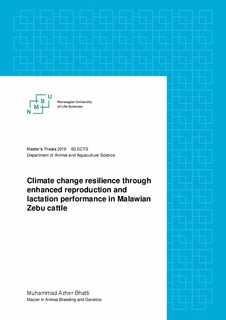Climate change resilience through enhanced reproduction and lactation performance in Malawian Zebu cattle
Master thesis
Permanent lenke
http://hdl.handle.net/11250/2436694Utgivelsesdato
2016Metadata
Vis full innførselSamlinger
- Master's theses (IHA) [318]
Sammendrag
Malawi is one of the most vulnerable countries to climate change in the world, and the site of our investigation, Bolero EPA (Extension Planning Area), Rumphi District, is particularly exposed. Climate change lead to a drier and longer dry seasons and erratic rainfall. Constrains on availability of food and water in the dry period has negative impacts on reproductive performance, milk production and calf growth. However, these problems affect farmers differently, and improved management is likely to give higher calving rates and therefore increased production of milk and meat. Through capacity building on successful Zebu cattle management in the Rumphi district in Malawi, the overall aim of the current project is to increase reproductive performance and lactation yields and thereby climate change resilience through the following sub goals:
(1) To describe the smallholder cattle farming system and ongoing general practices regarding management of Zebu cattle in the Bolero EPA, Rumphi District.
(2) To determine reproductive and lactation performance and important influencing factors in Zebu cattle calving in fall.
(3) To determine the prevalence of possible infectious causes for reproduction and production inefficiency in Zebu cattle.
The Norwegian Government and the Government of the Republic of Malawi are supporting the program “Capacity Building for Managing Climate Change in Malawi” (CABMACC). This thesis is a part of a sub-project of CABMACC entitled “Livestock value chain, food security, and environmental quality: Transforming rural livelihoods trough community based resilience indigenous livestock management practice”.
This study encompasses a cross sectional survey of management practices and reproductive performance in 39 Zebu cattle herds with 509 cattle, and a cohort study from the same farms following 101 fall-calving Malawian Zebu cows from calving and one year onwards. All the farmers in the study area are practicing an agro-pastoral production system.

